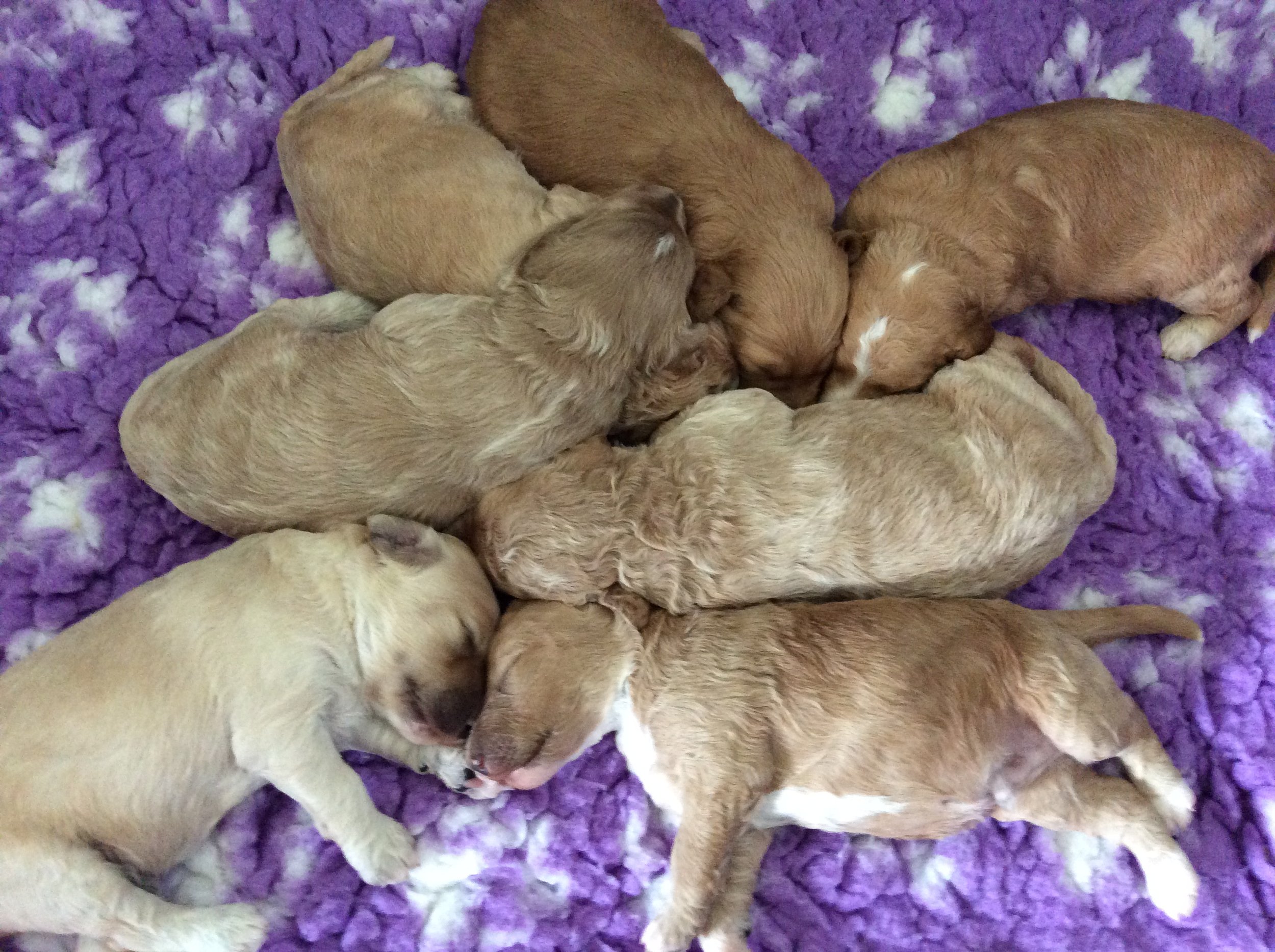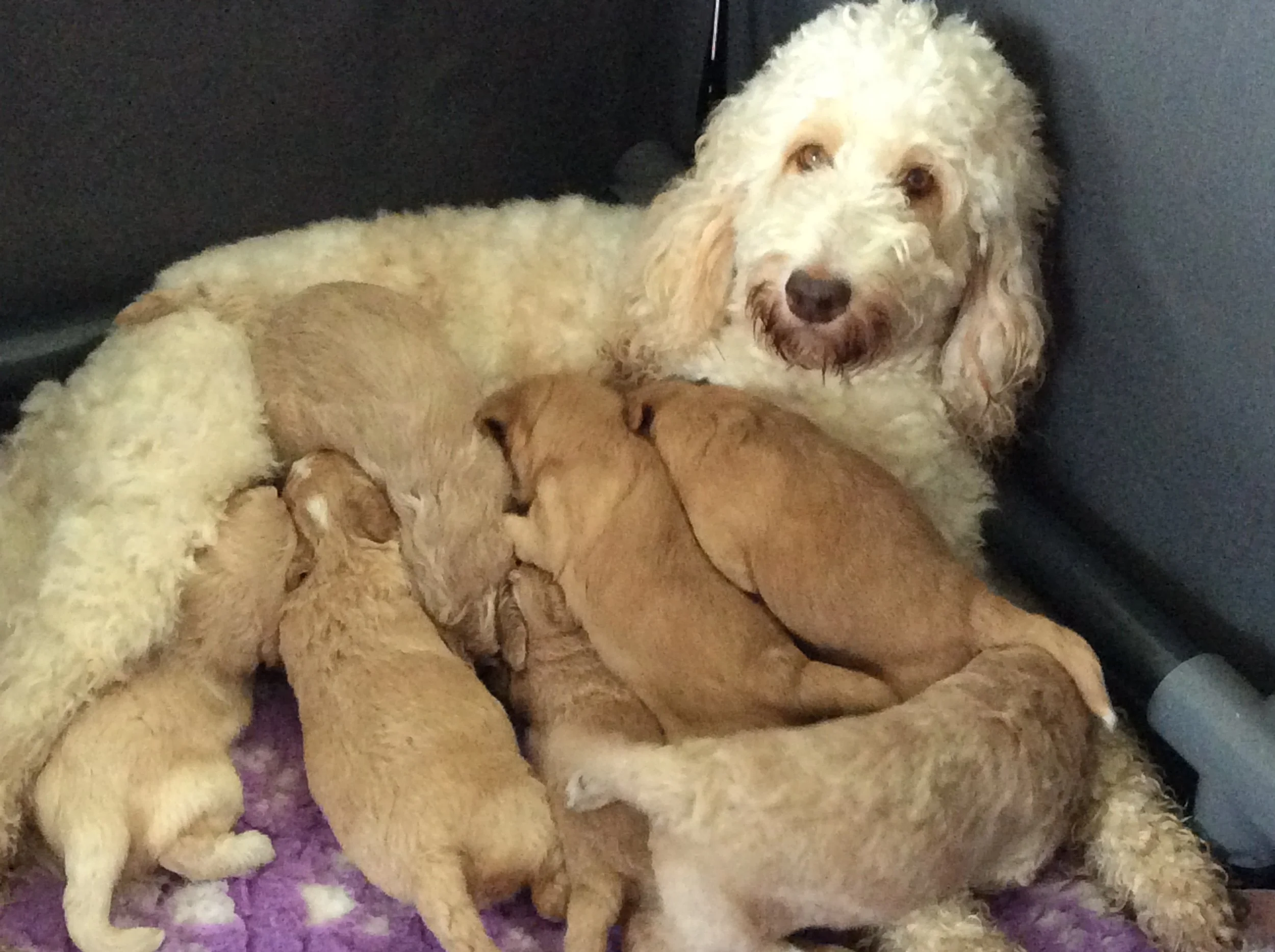Diary of a Doodle Doula
Thursday 8th October 2020
My labradoodle, Betsy, two years old and beautiful, is about to have her puppies. Seven were confirmed at the recent scan, and the expected date set at 12th October.
Expectant mum. Two weeks to go til she sees her puppies
We arrive at Cheristone Doodles HQ in Somerset and immediately feel more relaxed as we are now in the hands of the experts.
Friday 9th and Saturday 10th October
Betsy's eating for her country. She tries to enter the old routine of romping with brother Barnaby, and aunties Arwen and Bramble, but somehow her new barrel-shaped body just can't keep up. The others seem to understand and are gentle as she flops on the cool tiles of the kitchen floor.
We spend time alone and in peace in our private maternity suite, in the annexe to the Cheristone house, and our routine continues as before. Occasionally we pop in to the main house to keep connected with the other humans and dogs there.
Sunday 11th October
Betsy is becoming restless and unsettled. She doesn't seem able to get comfortable anywhere. Overnight she alternates between her own bed and mine.
Not much sleep is had.
Monday 12th October
Much the same. Walks outside turn into short sniffy ambles, with Betsy keen to turn back for home. (At this point, we didn't know that the puppies would arrive first thing on Tuesday morning …)
During the evening and into the night, things start to go up a gear. Betsy never settles for longer than a minute at a time. She starts digging among the vet-fleece rugs in her already-set-up whelping pen near the French doors. Digging, panting and pacing, she looks at me with questions in her eyes.
I can only give her love and reassurances that I honestly don't feel, even though I've been around three previous Cheristone births. This is a Betsy that's new to me, one I haven't seen before. Not quite on the 'distressed' spectrum, but certainly on the edges.
The night is long. I 'sleep' on the sofa bed in the same room as Betsy's whelping pen while she continues through this, the first stages of labour.
Tuesday 13th October
It's the early hours. I call Becky (my daughter) in from her sleep as I think Betsy's having contractions. She's sitting with her eyes closing, like her Aunty Bramble did during her labour. (Looking back, I think Betsy's simply trying to fall asleep sitting up, as lying down's too uncomfortable.)
Anyway, here we all are, in it together.
Suddenly, just before 6am, it happens. Into the whelping pen. Obvious contractions. Uncomfortable. Out pops the first pup. Along with it, Betsy produces a single yelp.
I reassure. “It's okay . . . ” I put her head into my chest. “I'll hold you, little one,” I tell her.
Hormones and instinct kick in. She turns to see her baby, licking and snuffling. Watches carefully as Becky checks its breathing and hands it back.
Between 6am and 9.30am she gives birth to seven beautiful little puppies. Oh, the relief! They're all perfect. They breathe! They suckle. They have all the right bits and pieces and nothing extra.
Four girls and three boys.
We give her a little downtime before changing her bedding and letting her settle down to motherhood, puppies suckling well.
Betsy's head is nodding with tiredness and her eyes are closing. Will she not lie down and rest her head properly? Apparently not – she needs to be able to keep an eye on the puppies and not let go completely. The confidence that they'll be all right if she sleeps will take another little while yet.
New little puppy family
Tonight, Becky takes the night shift as I catch up with the missed sleep of the previous two nights.
'Night shift' means light sleep, if any. You're constantly alert to goings-on in the whelping pen.
Are the puppies crying? Shouting?
Why?
Is mum unknowingly squashing them?
Are they lost on the other side of the pen, away from the rest of the family? Is Betsy whining, not knowing how to get the the little adventurer back?
She can't get up because the others are feeding.
What to do?
Wednesday 14th October
During the early hours, the pups manage to spread themselves out into the four corners of their 2m x 2m world, leaving Betsy to solve the real dilemma of how to be everywhere all at once.
This is all part of the learning process involved in becoming a new mum.
As the day progresses, Betsy becomes more relaxed. She knows the pups are okay even if she has to stretch herself right out to touch them with her nose. They wriggle back to her on their bellies when they're hungry, which is often.
She can finally let go and catch up on sleep, knowing her puppies will survive
I stay in the maternity suite with them, supplying Betsy with eight (that's EIGHT!) meals in 24 hours, and holding her water bowl so she can drink without having to get up and unceremoniously dump the puppies.
When we go outside so she can go to the loo, she dashes back in again.
I sit in the whelping pen with them all, look into her beautiful hazel eyes as she looks at me, and tell her how clever she is, how well she's doing, and what a wonderful mum she's being.
I hope she understands me and believes me.
UPDATE
Tuesday 10th November 2020
The puppies are four weeks old today.
We've settled into a good routine and all are surviving and thriving.
Betsy's working her way through the mountain of food stacked up in the kitchen. She's eating five times her normal intake but is gaining no weight as her puppies are taking most of the extra nourishment she's getting.
She gets outside for a 20-minute romp with her sister Abbie, who had her first litter of pups just a week after Betsy had hers.
They walk along in step with each other off-lead and free along the country lane that's the approach to Cheristone HQ. They romp in the fields that lie on either side of it, running and running. Their mental wellbeing is as important as their physical, and here they can learn that life-as-it-was is still there for them.
They share new motherhood secrets as they nuzzle ears and mouths. In this together.
This fourth week is a big week for the pups. Now their eyes are open, the whelping pen has been extended to allow more exploration space, and they've discovered playtime with their litter-mates. Around the same time, their little ears begin to work . . . unimaginable sensory overload.
The sides of the pen have lost their enclosing coverings – they have less need now for protection from draughts, and more need to be able to see out into their wider world.
We've started to wean them on to solid food – a huge change. Betsy was starting to feed them less, walking away from them after five minutes or so. Cue loud complaints from the customers at the milk bar!
Getting bigger now . . . at 6 weeks old
So it's time to bring out the raw meat and see how we go.
They start with two little meals a day, and will move to three, then four, slowly slowly as their little tummies get used to their new diet.
Three days in, they're doing well. Post-prandial snoozes are long and deep.
Betsy has mixed feelings, I think.
She's pleased for the break as the puppy teeth appear.
We're keeping their claws short – they're sharp (surprisingly sharp!) and we don't want them scratching her as they suckle.
After feeding, they're very playful. Betsy's trying to get used to the bopping of tiny paws on her nose, and puppies trying to climb up her legs and on her back.
She alternately looks puzzled and pleased.
At the same time, she doesn't want to let go of the control she's had up to now.
As her maternal hormones continue to drop, she won't mind this and will become more and more reluctant to let them suckle.
They'll become more reliant on solid food and will look to her for the odd serving of pudding and more for playtimes.
The ‘Romulus and Remus’ feeding position . . . got to grab a snack quickly before mum moves off
For me, as a carer, how's life?
Daytimes are a constant round of washing and drying puppy bedding, my own washing, feeding Betsy her seven meals a day (now reducing to five), and seeing to her grooming needs. Then there's taking her outside for toilet breaks (what goes in etc etc), which are many and quite interesting.
Puppy socialisation is an important part of the day, getting the little ones used to household noises, and to being handled and groomed. They're getting used to being apart from their litter-mates, starting with a few moments' separation and gradually building up the time.
Litter training is beginning.
They have soft toys in their pen that they can rough-and-tumble with, and hard ones they can bite on to help with teething. They have toys hanging on string above their heads, to get them used to the fact that much of their world is – and will be – above their heads.
They have me to cuddle within the pen, and outside it where I can stand up with them and they can be away from their siblings for a little while. It's all about them learning that there's nothing for them to be scared of.
They've listened to the sounds made by my radio, and by a specially compiled CD that features noises made by traffic, thunder, crowds, trains. They're learning that daytimes are light and busy, and nights quiet and dark. At 9pm the radio goes off, and so do the lights.
Night-times I've been able to sleep in my own bed since week three. It's just next door to the maternity unit, and I leave the connecting doors open so my girl can come and wake me when she wants to go outside. This happens three to five times a night – in all weathers. We've dealt with frosty nights, wet and windy nights, balmy full-moon nights and owl-hooty and fox-barky nights.
It's 40 years since I was woken in the night like this by my own babies, but somehow it's okay.
Betsy takes the night-shift feeds still and she's coping incredibly. She still sometimes looks to me for reassurance, and I continue to tell her she's doing great.
That everything's okay if the puppies practise their growls and barks, which they found a few days ago. That it's okay if they shoot backwards on their little legs when they let out a bark.
It's all, all okay.
Sharing secrets
Paperwork . . . lots and lots of paperwork.
We weigh the puppies every week, to make sure they’re ok. We record this.
We follow the Kennel Club recommended enrichment program. Hugely important. We record this.
We note any medical concerns and record these.
Time is found to take photos and videos for the families patiently waiting for week 8.
Zoom calls are held, ooohs and aahhhs are heard and love is sent through computer screens. COVID restrictions are harsh at times like these.
Becky answers any questions and concerns and helps with any getting-ready ideas.
These interactions are never enough . . . more are always wanted, but not enough hours in the day.
Week 8 approaches . . . going home time.
We get ready the puppy packs.
A blanket and cuddly toy scented with mum and siblings.
A little puppy grooming brush.
Microchip details and a free month of pet insurance.
A little snuffle toy, made by me and a few weeks’ supply of raw food.
Pick-up dates are arranged.
How to deal with this?!
Betsy’s mothering hormones are pretty low now.
She hasn’t offered to feed the puppies in several days and spends her time either playing with them, showing how to play “chase” and “tug” or supervising their own playtimes. But how will she cope with seeing them go? Actually GO.
Puppies need lots of sleep and will just collapse in situ, in the middle of a play session
The families are to come to the back garden, where the handover will take place.
For the first puppy, Betsy stays inside and takes no part . . . we think this will be best.
It isn’t.
This is a new game which she doesn’t understand.
I’m not as sad to see the puppy leave as I thought I might be, because instead, I’m sad to see my girl confused and I’m trying to work out quickly how to make this game better for her.
For the next and subsequent puppies, we get Betsy outside to meet the new families and play with them and each puppy for a few minutes before the new little units drift away to their new lives.
This seems better and she’s more able to accept what’s happening.
Three puppies remain, to go home another day, so this helps too.
There’s still chasing and leaping and mayhem . . . she even seems more able to give quality time to a smaller litter and the playtimes are rich and beautiful.
Eventually, the adventure is over and it’s time for us to return home to our old lives, our old routines. It seems like such a long time ago that we we just the two of us in our quiet little home in Hampshire.
Yet, here we are . . . rediscovering our old walks, our old haunts, our old playmates.
Life returning to normal
Betsy takes a while to begin letting go of her need to be on lookout and is more skittish to noises and new people than she was. Her behaviour is different. I only notice this because we’re back home re-establishing our old lives.
Writing this in March, after we came home in December, she’s settling. She’s more snuggly than before, which of course is lovely. She’s still a little “on alert” in the garden and on walks but this is easing.
I’m trying to let go too.
Letting go of the anxieties of the new and unknown.
The brush with mastitis, the worry of realising her usual food wasn’t providing her with the nutrition she needed while she was feeding puppies. Swapping her over to raw feeding and seeing how she thrived and feeling guilty over my shortcomings.
Letting go of the niggling thought that I don’t want to put her or myself through this again, as her next pregnancy is being planned for the end of this year.
In the meantime, we’re enjoying our comparatively quiet and simple lives.
My beautiful, clever girl………….
I needed to write this diary to help me process what was a new and quite honestly, frightening, experience for me when I was involved in all this for the first time. I’ve had two further experiences with Betsy’s subsequent whelpings and the emotions are still true, though calmer.
I think it may also be useful to share this to foster understanding of what’s involved in the life of a breeder, both physically and emotionally. All too often the cry is “How much?!” (are they asking for a puppy). I hope this may go some way to explaining.










